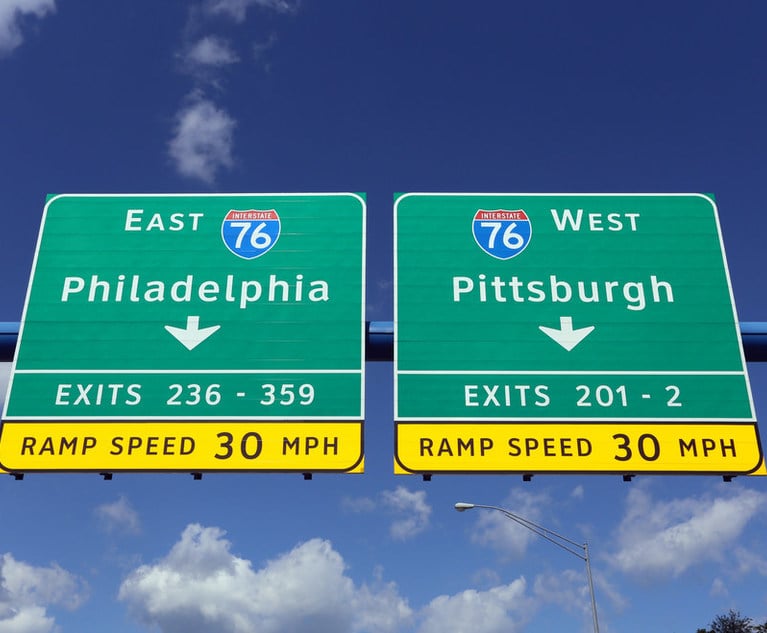 (Photo: Ken Wolter/Shutterstock.com)
(Photo: Ken Wolter/Shutterstock.com)Morgan Lewis Repping Amazon in Medical Marijuana Lawsuit Over Fired Warehouse Worker
The filing comes just as the New Jersey Supreme Court is poised to take up the issue of medical marijuana in the workplace.
November 08, 2019 at 05:16 PM
3 minute read
The original version of this story was published on New Jersey Law Journal
Amazon is facing a disability discrimination lawsuit from a New Jersey warehouse worker who was fired for using medical marijuana.
The lawsuit, by a plaintiff identified as D.J.C., was filed in Middlesex County Superior Court in October and removed to federal court Friday. The Amazon filing comes just as the state Supreme Court is poised to take up the issue of medical marijuana in the workplace.
The justices announced in June that they will hear an appeal concerning the obligation of employers to accommodate medical marijuana use. The plaintiff in that case, a fired funeral home director, has asked the court to overturn a ruling finding employers are not obligated to accommodate medical marijuana usage.
D.J.C., who worked at the Amazon warehouse in Edison, was prescribed medical marijuana for anxiety and panic disorder. He was ordered to take to a drug test in July 2018, and was notified a month later he was being fired for testing positive, the suit says. When he told company representatives that he was a participant in the state's medical marijuana program, he was told he was being placed on paid leave, according to court papers. He was asked to submit paperwork to request an accommodation but was then told he was terminated for failing to notify the company he was a medical marijuana user, the suit says.
D.J.C. is represented by Walter Dana Venneman of Gill & Chamas in Woodbridge. Amazon's lawyer is August Heckman III of Morgan, Lewis & Bockius.
D.J.C.'s suit says Amazon has a policy of considering rehiring terminated employees after 120 days, even those who are fired for failing drug tests, but he was "blacklisted" by the company and could not get hired at Whole Foods, which is owned by Amazon. His suit seeks to enjoin Amazon from further discriminatory acts as well as reinstatement, compensatory and punitive damages, attorney fees and costs.
Venneman said the current medical marijuana statute makes it illegal to take an adverse employment action against someone for being a medical marijuana user, and he doesn't necessarily feel Supreme Court guidance is needed in his case. Venneman added that his client's circumstances differ from those in the case headed for the Supreme Court because the plaintiff in that case was required to operate a vehicle as part of his job.
"For any employer to have a blanket prohibition on their employees using medical cannabis, I think that is going to be flatly illegal, based on the statute," Venneman said.
Venneman thinks the case will require Amazon to make a reasonable accommodation to employees using medical marijuana, although doing so is difficult since there's no easy way to measure it. The readings that are used to measure impairment from alcohol have no counterpart for measuring marijuana, he said.
An amendment to the medical marijuana law, adopted in July, bars employers from taking adverse action based solely a worker's status as a medical cannabis patient. Additionally, the law provides protections for current and prospective employees who test positive for cannabis.
Heckman, the Amazon lawyer, did not return a call about the case.
This content has been archived. It is available through our partners, LexisNexis® and Bloomberg Law.
To view this content, please continue to their sites.
Not a Lexis Subscriber?
Subscribe Now
Not a Bloomberg Law Subscriber?
Subscribe Now
NOT FOR REPRINT
© 2024 ALM Global, LLC, All Rights Reserved. Request academic re-use from www.copyright.com. All other uses, submit a request to [email protected]. For more information visit Asset & Logo Licensing.
You Might Like
View All
Special Section: Products Liability, Mass Torts & Class Action/Personal Injury
2 minute read

Pa. Firms Set to Finish Year Strong, Thanks to Demand Uptick, Shorter Collections Cycle
4 minute read
Immunity for Mental Health Care and Coverage for CBD: What's on the Pa. High Court's November Calendar
5 minute readTrending Stories
- 1O'Melveny, Bracewell Add Lawyers to Texas Energy Teams
- 2Who Got the Work: 16 Lawyers Appointed to BioLab Class Action Litigation
- 3White & Case Settles Wrongful Conviction Lawsuit With City Agreeing to Pay $9.45 Million
- 43 New Judges: Here's Who Kemp Just Appointed to the Bench
- 5Apple Asks Judge to 'Follow the Majority Practice' in Dismissing Patent Dispute Over Night Vision Technology
Who Got The Work
Michael G. Bongiorno, Andrew Scott Dulberg and Elizabeth E. Driscoll from Wilmer Cutler Pickering Hale and Dorr have stepped in to represent Symbotic Inc., an A.I.-enabled technology platform that focuses on increasing supply chain efficiency, and other defendants in a pending shareholder derivative lawsuit. The case, filed Oct. 2 in Massachusetts District Court by the Brown Law Firm on behalf of Stephen Austen, accuses certain officers and directors of misleading investors in regard to Symbotic's potential for margin growth by failing to disclose that the company was not equipped to timely deploy its systems or manage expenses through project delays. The case, assigned to U.S. District Judge Nathaniel M. Gorton, is 1:24-cv-12522, Austen v. Cohen et al.
Who Got The Work
Edmund Polubinski and Marie Killmond of Davis Polk & Wardwell have entered appearances for data platform software development company MongoDB and other defendants in a pending shareholder derivative lawsuit. The action, filed Oct. 7 in New York Southern District Court by the Brown Law Firm, accuses the company's directors and/or officers of falsely expressing confidence in the company’s restructuring of its sales incentive plan and downplaying the severity of decreases in its upfront commitments. The case is 1:24-cv-07594, Roy v. Ittycheria et al.
Who Got The Work
Amy O. Bruchs and Kurt F. Ellison of Michael Best & Friedrich have entered appearances for Epic Systems Corp. in a pending employment discrimination lawsuit. The suit was filed Sept. 7 in Wisconsin Western District Court by Levine Eisberner LLC and Siri & Glimstad on behalf of a project manager who claims that he was wrongfully terminated after applying for a religious exemption to the defendant's COVID-19 vaccine mandate. The case, assigned to U.S. Magistrate Judge Anita Marie Boor, is 3:24-cv-00630, Secker, Nathan v. Epic Systems Corporation.
Who Got The Work
David X. Sullivan, Thomas J. Finn and Gregory A. Hall from McCarter & English have entered appearances for Sunrun Installation Services in a pending civil rights lawsuit. The complaint was filed Sept. 4 in Connecticut District Court by attorney Robert M. Berke on behalf of former employee George Edward Steins, who was arrested and charged with employing an unregistered home improvement salesperson. The complaint alleges that had Sunrun informed the Connecticut Department of Consumer Protection that the plaintiff's employment had ended in 2017 and that he no longer held Sunrun's home improvement contractor license, he would not have been hit with charges, which were dismissed in May 2024. The case, assigned to U.S. District Judge Jeffrey A. Meyer, is 3:24-cv-01423, Steins v. Sunrun, Inc. et al.
Who Got The Work
Greenberg Traurig shareholder Joshua L. Raskin has entered an appearance for boohoo.com UK Ltd. in a pending patent infringement lawsuit. The suit, filed Sept. 3 in Texas Eastern District Court by Rozier Hardt McDonough on behalf of Alto Dynamics, asserts five patents related to an online shopping platform. The case, assigned to U.S. District Judge Rodney Gilstrap, is 2:24-cv-00719, Alto Dynamics, LLC v. boohoo.com UK Limited.
Featured Firms
Law Offices of Gary Martin Hays & Associates, P.C.
(470) 294-1674
Law Offices of Mark E. Salomone
(857) 444-6468
Smith & Hassler
(713) 739-1250





